Related Research Articles

Carl Lee Perkins was an American guitarist, singer and songwriter. A rockabilly great and pioneer of rock and roll, he began his recording career at the Sun Studio, in Memphis, beginning in 1954. Among his best-known songs are "Blue Suede Shoes", "Honey Don't", "Matchbox" and "Everybody's Trying to Be My Baby".

James Edward Burton is an American guitarist. A member of the Rock and Roll Hall of Fame since 2001, Burton has also been recognized by the Rockabilly Hall of Fame and the Musicians Hall of Fame and Museum. Critic Mark Deming writes that "Burton has a well-deserved reputation as one of the finest guitar pickers in either country or rock ... Burton is one of the best guitar players to ever touch a fretboard." He is ranked number 24 in Rolling Stone list of 250 greatest guitarists of all time.

Winfield Scott Moore III was an American guitarist who formed The Blue Moon Boys in 1954, Elvis Presley's backing band. He was studio and touring guitarist for Presley between 1954 and 1968.
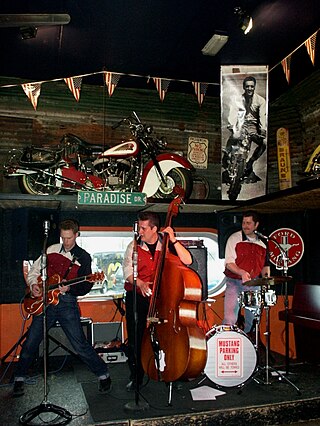
Rockabilly is an early style of rock and roll music. It dates back to the early 1950s in the United States, especially the South. As a genre, it blends the sound of Western musical styles such as country with that of rhythm and blues, leading to what is considered "classic" rock and roll. The term "rockabilly" itself is a portmanteau of "rock" and "hillbilly"; the latter is a reference to country music that contributed strongly to the style. Other important influences on rockabilly include western swing, boogie-woogie, jump blues, and electric blues.

John LaGale Horton was an American country, honky tonk and rockabilly musician during the 1950s. He is best known for a series of history-inspired narrative country saga songs that became international hits. His 1959 single "The Battle of New Orleans" was awarded the 1960 Grammy Award for Best Country & Western Recording. The song was awarded the Grammy Hall of Fame Award and in 2001 ranked No. 333 of the Recording Industry Association of America's "Songs of the Century". His first No. 1 country song was in 1959, "When It's Springtime in Alaska ".
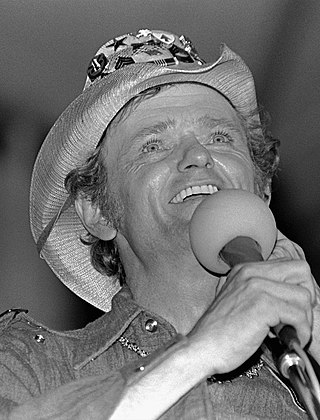
Jerry Reed Hubbard, known professionally as Jerry Reed, was an American singer, guitarist, composer, songwriter and actor who appeared in more than a dozen films. His signature songs included "Guitar Man", "U.S. Male", "A Thing Called Love", "Alabama Wild Man", "Amos Moses", "When You're Hot, You're Hot", "Ko-Ko Joe", "Lord, Mr. Ford", "East Bound and Down", "The Bird", and "She Got the Goldmine ".

William Patton Black Jr. was an American musician and bandleader who is noted as one of the pioneers of rock and roll. He played in Elvis Presley's early trio, The Blue Moon Boys. Black later formed Bill Black's Combo.
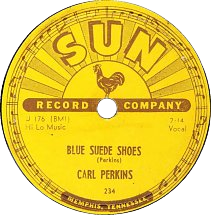
"Blue Suede Shoes" is a rock and roll standard written and first recorded by American singer, songwriter and guitarist Carl Perkins in 1955. It is considered one of the first rockabilly records, incorporating elements of blues, country and pop music of the time. Perkins' original version of the song appeared on the Cashbox Best Selling Singles list for 16 weeks and spent two weeks at the number two position.
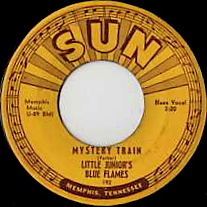
"Mystery Train" is a song written and recorded by American blues musician Junior Parker in 1953. Originally performed in the style of a Memphis blues or rhythm and blues tune, it was inspired by earlier songs and later became a popular rockabilly song, as first covered by Elvis Presley, then numerous others.

Dominic Joseph Fontana was an American musician best known as the drummer for Elvis Presley for 14 years. In 1955, he was hired to play drums for Presley, which marked the beginning of a 15-year relationship. He played on over 460 RCA recordings with Elvis.

Paul Burlison was an American pioneer rockabilly guitarist and a founding member of The Rock and Roll Trio. Burlison was born in Brownsville, Tennessee, where he was exposed to music at an early age. After a stint in the United States Military, Burlison teamed up with Johnny and Dorsey Burnette to form The Rock and Roll Trio. The band released several singles, but failed to attain chart success. Paul is sometimes credited with being the first guitarist to intentionally record with a distorted electric guitar on the 1956 recordings, "Lonesome Train on a Lonesome Track" and "Honey Hush." The trio disbanded in the fall of 1957 and Burlison moved back to Tennessee to start a family. There he started his own electrical subcontracting business which he ran faithfully for twenty years, taking a break when the trio reunited in the early 1980s. He released his only solo album in 1997, which received positive reviews. Burlison remained active in the music scene until his death in 2003.

Eddie Bond was an American singer and guitarist who was active in country music and rockabilly.
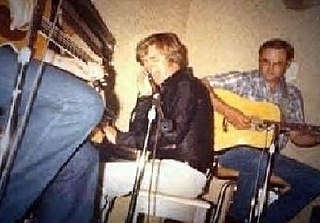
Robert G. Lee Sowell is an American musician, pianist and composer. He spent much of his early years playing rockabilly piano in the late 1950s, playing organ in rock-and-roll bands in the 1960s and playing piano in numerous country music bands from the 1970s to the 1990s. He was a Mid-South Fair winner in 1966 and was inducted into the Rockabilly Hall of Fame in 2002. In 1994, he went out as a solo artist. As a pianist and composer, Sowell has recorded eight albums, crossing many genres of music, from jazz, pop, rock and roll, honky tonk and blues to country music, gospel and easy listening.

The King of Rock 'n' Roll: The Complete 50's Masters is a five-disc box set compilation of the complete known studio master recordings by American singer and musician Elvis Presley during the decade of the 1950s. Issued in 1992 by RCA Records, catalog number 66050-2, it was soon followed by similar box sets covering Presley's musical output in the 1960s and 1970s. This set's initial long-box release included a set of collectible stamps duplicating the record jackets from every Presley LP on RCA Victor, every single that had a picture sleeve, and most of his EP releases. The set includes a booklet with an extensive session list and discography, and a lengthy essay by Peter Guralnick. It peaked at #159 on the album chart and was certified a gold record on August 7, 1992, by the RIAA. Further certifications were for platinum on November 20, 1992, and for double platinum on July 30, 2002.

Thomas Paulsley LaBeff, known professionally as Sleepy LaBeef, was an American singer and musician.

"Glad All Over" is a 1957 song recorded by rock and roll and rockabilly artist Carl Perkins, "The Rockin' Guitar Man", at Sun Records in 1957. It was released as a 45 and 78 single, Sun 287, on January 6, 1958. It was written by Aaron Schroeder, Sid Tepper, and Roy Bennett. It is not the same song as the single "Glad All Over" released in 1963 by The Dave Clark Five.
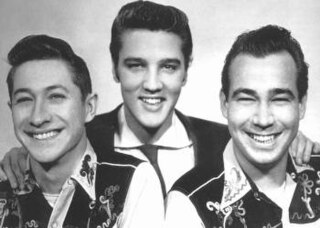
The Blue Moon Boys were an American rock and roll band that was formed by Elvis Presley, lead guitarist Scotty Moore and double bass player Bill Black. The group members were introduced by Sun Studio owner Sam Phillips in 1954, except for D.J. Fontana, who joined the group during a Louisiana Hayride tour in 1955. The Blue Moon Boys were inducted into the Musicians Hall of Fame and Museum in 2007. The band was named after Bill Monroe's song "Blue Moon of Kentucky".
The Snearly Ranch Boys were a band that formed around 1950 in Memphis, Tennessee. The band was a launching platform for many of the musicians who contributed to the Memphis music scene that revolved around Sam Phillips and Sun Records. Members of the Snearly Ranch Boys included Bill Black, Jim Stewart, Jerry Lee Lewis, Reggie Young, Ace Cannon, Barbara Pittman, and Johnny Benero. A later version of the Ranch Boys centering on steel guitarist, Stan Kesler and drummer, Clyde Leoppard, who became a part of the Sun Studio session band, recording for numerous Sun artists.
Tommy Blake was an American rockabilly singer and songwriter active in the 1950s to the 1970s. Regarded as a skilled writer, Blake penned several songs that were later recorded by rock and country music artists, including Johnny Horton, George Jones, and Johnny Cash among others. He also achieved modest success as a recording artist for Sun Records, but failed to record a national hit himself, a fact that frustrated Blake later in his life. Retrospectively, he has received praise for his contributions to rockabilly and was inducted in the Rockabilly Hall of Fame.

Jimmy Day was an American steel guitarist active in the 1950s and 1960s whose career in country music blossomed about the time the pedal steel guitar was invented after pedals were added to the lap steel guitar. He was a pioneer on pedal steel in the genres of Western swing and Honky tonk and his modifications of the instrument's design have become a standard on the modern pedal steel. Day's first job after high school was performing on the Louisiana Hayride as a sideman accompanying developing country artists including Hank Williams, Webb Pierce, Willie Nelson, Jim Reeves, Ray Price and Elvis Presley. He recorded and toured with all these artists and was featured on hit records by of many of them, including Ray Price's, "Crazy Arms" and "Heartaches by the Number". He was a member of Elvis Presley's band for about a year, but, along with fellow bandmate Floyd Cramer, resigned after Presley requested them to re-locate to Hollywood; instead, Day moved to Nashville to work as a session player and Grand Ole Opry musician. He was a member of the Western Swing Hall of Fame (1994) and the International Steel Guitar Hall of Fame (1999). Day died of cancer in 1999.
References
- 1 2 "Pat Cupp, Long Gone Rockabilly Daddy". rockabilly.nl. Retrieved September 8, 2015.
- ↑ "Pat Cupp interview". jumpingfrom6to6.com. Retrieved September 8, 2015.
- 1 2 3 "PAT CUPP". rockabillyhall.com. Retrieved September 8, 2015.
- ↑ "Long Gone Daddy". acerecords.co.uk. Retrieved September 8, 2015.